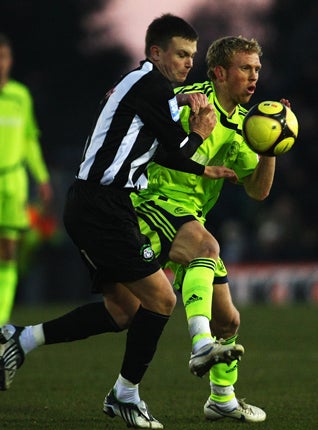Player at heart of betting scandal reveals illegal gambling is rife
Andy Mangan, who served FA ban, says envy of Premier League lifestyle drives corrupt practices in lower divisions

One of the five players banned by the Football Association for betting on the outcome of their own match has told The Independent that the vast gulf in pay between the Premier League and lower divisions is causing Football League players to commit the same offence.
Andy Mangan's interview is the first given by any of the five men banned for betting thousands of pounds on what turned out to be the correct outcome of the Accrington Stanley v Bury match in May 2008. Mangan, then at Bury though now at Wrexham, has told this newspaper that gambling is drawing in young players whose desire for the trappings of success they see higher up the football ladder leads them to overlook the rules forbidding gambling on competitions they play in.
Mangan, who declares that the five-month ban he received in July 2009 has convinced him to end his own serious betting habit, said that young players are "vulnerable" to gambling but do not focus on the FA's message that those who bet on any match or competition in which they are involved are liable to be banned.
"I know for a fact [players] are gambling on their [own] league, when you are not allowed," Mangan said. "I know that – and I know some players know that – but everyone's got to know because there are consequences if they get caught."
The FA regulatory commission's full written ruling on the case, seen by The Independent, acknowledged that the rule Mangan and four Accrington players breached – E8a – was "not easy reading" and the guidance "may not reliably find its way to every player well, then not be read with care".
But regardless of such complexities, the disparity in wages is leaving impressionable young players vulnerable to betting on games, and thus to criminal gangs who may seek to profit from match-fixing and spot-fixing. "The younger players look at the [wealthy] ones who are on a lot more and think: 'I would like a lot more money'," Mangan said. "When you're in that situation you look at the magazines, all the papers, at all the Premier League boys buying all these cars and you think to yourself: 'I'd love that.' Maybe they might be good enough to get that, but at the time they're not at the top level. You want it – so how do you get it?"
The average weekly salary at Accrington at the time of the betting case was around £800, the same figure that some Premier League players will earn every hour. The FA does not take issue with Mangan's claims that some players are unaware of the rules and acknowledges that it is at the lower end of the game that the risk of illegal betting exists. But all clubs are offered briefings on the rules from FA disciplinary governance officers who tour clubs at all levels in the close season.
Clubs must take ultimate responsibility for the education of their younger players. "Professional footballers know that there are FA rules and if they take no trouble at all to find out what is in them, they cannot reasonably complain if they are charged and punished when they act in breach of the rules," concluded the commission's chairman, Nicholas Stewart QC, in his ruling on the Accrington Five. "That certainly applies to the rules against betting."
Mangan has flourished since serving his ban and returning to football in January 2009. He is spearheading the drive for promotion back to League Two at Dean Saunders' Wrexham and his relationship with the FA turned full circle when he was called up to the England C team that beat Belgium at Kenilworth Road this month.
The 24-year-old has offered his services to the Professional Footballers' Association to go into clubs and drive home the message about betting. "I've told them if they want me to go in as someone who's had experience of being banned, then I will," Mangan said. "They can say, 'This is Andy Mangan and he's been banned for gambling on football', which might make players want to listen." The PFA, which was not available to comment yesterday, is yet to take Mangan up on his offer.
Figures from the Gambling Commission have revealed a surge in reports of irregular betting on games in the past year. More than 50 cases have been referred to the commission, with football featuring prominently and most of them at League Two or non-League level.
Mangan was convicted with the four Accrington players – Jay Harris, David Mannix, Robert Williams and the club captain Peter Cavanagh, who all bet that their side would lose (which they did, 2-0). Mangan backed his own club, but the commission considered it suspicious that he went into a betting shop with Harris and Mannix, and its report expressed "serious concern the match may have been fixed" – though that was not part of the FA case.
Mangan's testimony comes as the World Anti-Doping Agency delivers evidence of criminal activity seeking to capitalise on the vulnerability of players to gambling. David Howman, Wada's director-general, said he had "compelling information" from briefings with American enforcement agencies that underworld figures are turning from steroid trafficking to match-fixing. Howman has called for the establishment of a global body to tackle illegal betting in sport, and also bribery and corruption.
Join our commenting forum
Join thought-provoking conversations, follow other Independent readers and see their replies
Comments
Bookmark popover
Removed from bookmarks